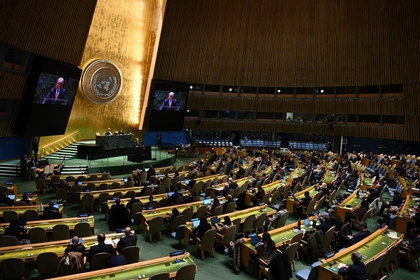In the Russian city of Saratov, 35-year-old Azamat Iskaliyev went to a mobile phone shop to resolve issues with his girlfriend who wanted to break up with him. When she did not share his feelings, he coldly stabbed her to death an act that was captured by surveillance cameras, according to the Ukrainian state project “I Want to Live!”
Iskaliyev had been serving a prison sentence for killing his wife, who had tried to divorce him. In 2021, he was sentenced to nine years in prison but was released early after signing a contract with the Russian Ministry of Defense. Apparently, the war did not reform him; it only allowed him to evade punishment and release him to commit another crime.
JOIN US ON TELEGRAM
Follow our coverage of the war on the @Kyivpost_official.
As noted by the “I Want to Live” project, the Russian authorities are doing their best to conceal the nature and scale of crimes committed by those returning from war, but it is becoming increasingly difficult to hide. To many Russia is slowly but surely drowning in its own blood. And this is could just be the beginning, as only a small fraction of its “liberators” have returned home.
The “I Want to Live” [Хочу Жить!] project was set up by Ukraine’s Main Directorate of Intelligence (HUR) with the aim of helping Russian soldiers disillusioned with the war to safely surrender to the Ukrainian Armed Forces (AFU) and save their lives.
There are more and more instances of people becoming victims of Russian military personnel who have returned from Ukraine. In almost three years of war, almost 500 Russian citizens have been attacked and murdered by returnees. According to the Verstka news site at least 242 people have died, another 227 have sustained life-threatening injuries and countless others have experienced from robbery, physical and sexual assault.

US Urges Backing of ‘Simple’ UN Resolution as Trump Calls for Putin-Zelensky Talks
One-third of all victims are women: 32 out of 85 cases are former prisoners (38%), and 17 out of 55 (31%) are military victims. Among the military victims, there are 2 underage girls.
The majority of this rise in crimes have been committed against relatives and acquaintances of the returning military men often as a result of excessive alcohol consumption and drugs use - later, many complained of uncontrollable outbursts of rage. Psychologists put this down to post traumatic stress disorder (PTSD) which is amplified in those who may have already had a predilection towards violence
It is particularly alarming to note that former prisoners are more likely to commit murder crimes against women than other returning military personnel. Russian authorities say they have launched a program to treat military returning from the front who are suffering from PTSD. According to a June Deutsche Welle report the syndrome is so widespread only a small proportion of those affected can be treated and many refuse any offers of help.
Many commentators feel the numbers quoted by Vertska are just the tip of the iceberg and that the actual number of such crimes is much higher. Russia’s courts do not publish all rulings in cases, and their decisions often do not indicate that the perpetrator had served in Ukraine or was a former prisoner who had received a presidential pardon.
You can also highlight the text and press Ctrl + Enter











